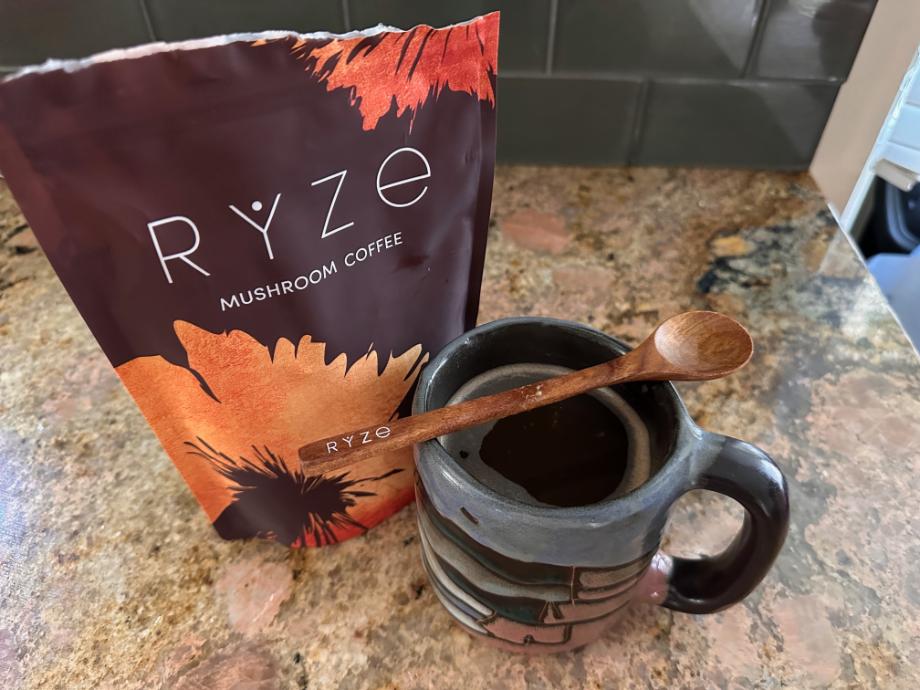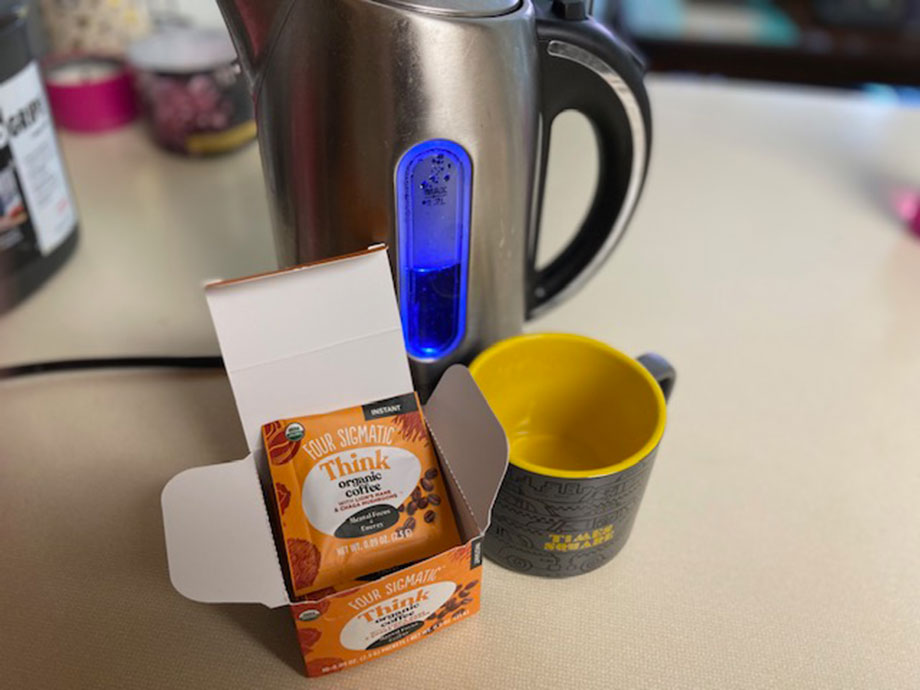Whether they’re referred to as functional, medicinal, adaptogenic, or superfoods, mushrooms are having a moment. Of course, I’m not talking about the common white button or portobellos you find in the produce aisle. Lion’s mane mushrooms, reishi, and cordyceps are a few of the ancient species that are touted as nutrition powerhouses and being added to all sorts of dietary supplements, like coffee, energy drinks, and protein powder.
Part of the allure is that functional mushrooms have reportedly been used for hundreds of years, if not thousands, in Eastern wellness practices, including Ayurveda and Traditional Chinese Medicine. If you’ve read about the health claims of these types of mushrooms, a daily drink seems like an easy way to level-up your well-being.
RELATED: Best Mushroom Coffee
In this article, we’re taking a look at the hype around mushroom coffee. I’ll break down the difference between 100% mushroom coffee versus blends with actual coffee, the latest research findings about mushroom coffee, and whether the buzz around mushroom coffee benefits is worth making it your morning beverage of choice.
Medical disclaimer: This article is intended for educational and informational purposes only. It is not intended as a substitute for medical advice. For health advice, contact a licensed healthcare provider.
What Is Mushroom Coffee?
Mushroom coffee typically contains a blend of dried, powdered mushrooms or mushroom extracts and may or may not contain ground coffee beans. MUD\WTR is an example of a coffee-free mushroom coffee (it contains tea instead of coffee) and RYZE and Four Sigmatic are examples of mushroom and caffeinated coffee blends.
RELATED: What Is Mushroom Coffee?

Mushroom coffee that contains actual coffee delivers less caffeine per serving than a standard cup of black coffee. How much less? The majority of popular mushroom coffees on Amazon contain around 50 milligrams of caffeine per serving. An 8-ounce cup of coffee has about 90 to 100 milligrams, so the caffeine content is basically cut in half.
You’ll typically find a blend of chaga, lion’s mane, reishi, and/or cordyceps in most mushroom coffees, but some contain more mushroom varieties. Some brands are also formulated with other adaptogens and nootropics, like ashwagandha. Mushroom coffee may also contain sweetener, coconut milk, MCT oil (medium-chain triglyceride oil), cocoa, or other flavorings for a ready-to-drink beverage.
Nutrition-wise, mushroom coffee isn’t all that different from regular coffee. It’s low in calories, rich in antioxidants, and basically free from all three macronutrients. Mushroom coffees with additional ingredients, like coconut milk, contain more calories and a few grams of fat, carbohydrates, and protein per serving.
Some mushroom coffees are prepared by adding a scoop of powder to hot water, similar to instant coffee, while you can brew others in a drip-style coffee maker or French press. You can also find mushroom coffee in individual cups that can be brewed in a coffee pod machine. Creamer, sweetener, or flavored syrups can be added to mushroom coffee to make traditional lattes and more.
RELATED: Everyday Dose Mushroom Coffee Review
Benefits of Mushroom Coffee
Functional mushrooms contain nutrients and compounds that have been linked to benefits for mind and body. Here are the potential health benefits of mushroom coffee:
May Support Energy Levels
As mentioned before, functional mushrooms are also adaptogens, which means they support a balanced state and can help combat the side effects of stress. Think about how you feel when you’re stressed. Stress contributes to feeling less energized and more tired than usual.

The adaptogenic compounds in cordyceps, lion’s mane, and reishi mushrooms—the most common types found in mushroom coffee—may promote energy by lowering stress-induced fatigue. These mushrooms are also associated with improved mood, focus, and concentration1—all key components that influence energy levels.
May Improve Workout Performance
Mushroom coffee may help boost exercise strength and endurance, similar to one of the best pre-workouts.
Studies have found cordyceps supplementation increases ATP production2, which is the cellular energy that powers your muscles during exercise. It also appears to help your body take in more oxygen during exercise3, which is essential for cellular energy production.
Both cordyceps4 and reishi5 mushrooms have been linked to improved exercise endurance and decreased lactic acid production, which contributes to muscle fatigue.
May Support Better Sleep
Making the switch from regular coffee or caffeinated energy drinks to mushroom coffee may improve the quality and duration of your sleep. There are two mechanisms to this benefit.

First, mushroom coffee is a low-caffeine drink. One of the drawbacks of caffeine is its impact on sleep. High intakes of caffeine and consuming caffeine later in the day can make it tough to wind down and fall asleep. You may be able to enjoy mushroom coffee in the afternoon or early evening hours without it disrupting your nightly rest.
Second, some compounds in functional mushrooms are adaptogenic, which means they help your body adapt to external and internal stressors and lower levels of cortisol, the stress hormone. Stress is a sleep deterrent, so it makes sense that anything that can help manage your body’s stress levels can result in improved sleep.
Reishi mushrooms in particular have been found to promote rest and recovery. In a 2021 animal study6, reishi supplementation resulted in falling asleep faster and an increase in total sleep time. That means a daily dose of reishi from mushroom coffee may translate to an easier time falling asleep and staying asleep.
Less Stimulant Side Effects
Moderate and high doses of caffeine, like those found in espresso, energy drinks, and high-stim pre-workouts, come with a higher risk of stimulant-induced side effects, like jitters, feeling anxious, upset stomach, and headache.
RELATED: Pre-Workout Side Effects

Mushroom coffee is a low-caffeine supplement and is less likely to bring on these side effects. Since mushroom coffee contains half the amount of caffeine as regular coffee, it may be a good choice for individuals who are sensitive to caffeine or trying to cut back on caffeine intake.
May Be Immune-Boosting
Both mushrooms and coffee beans have compounds with antioxidant properties that help protect the cells of your body from damage and premature aging that can contribute to chronic health problems.
Mushrooms are especially good sources of bioactive compounds, including polysaccharides, polyphenols, and triterpenes, that are associated with improved immune function. Studies have found these bioactive compounds stimulate the immune system7 to produce more defenders, including T-cells and white blood cells, that protect our bodies from bacteria, viruses, allergens, and other inflammatory invaders.
Risks and Downsides of Mushroom Coffee
Cost
Cup for cup, mushroom coffee tends to be more expensive than regular coffee. Unfortunately, that’s the price for growing, harvesting, and processing these types of mushrooms.
My best budgeting tip is to check the Supplement Facts label for how many servings are in a package and compare that to how many cups you expect to drink per day. Then, you’ll get an idea of cost per day, how long a bag of mushroom coffee will last you, and if the cost is feasible with your budget.
Taste
Taste is 100% subjective, but I wouldn’t be doing you a solid if I wasn’t honest about my experience with mushroom coffee. I’m a coffee drinker and thought the mushroom coffees I’ve tried tasted weak, watery, and definitely earthy compared to my usual brew.

Some customers say mushroom coffee has a coffee taste or find the benefits outweigh a flavor and texture that’s just so-so. Of course, you don’t have to give up coffee entirely if you want to try mushroom coffee. Mushroom coffee may help you cut back on the amount of coffee you drink or become your go-to for afternoon energy with fewer side effects than higher caffeine drinks.
RELATED: MUD WTR vs RYZE
Digestion
Although there’s evidence suggesting the fiber content in functional mushrooms can support gut health, mushroom coffee can be tough on some people’s digestion. Chaga mushrooms contain high levels of oxalates8, which can trigger stomach pain, bloating, and altered bowel movements in some. Oxalates also contribute to the formation of kidney stones in those who are prone to them.
Nutrient Profile
Most brands of mushroom coffees tell you what types of mushrooms they contain, but not all disclose how much of each you get per serving. Some products only tell you how much of their ground mushroom blend is in the product, which means mushroom coffee blends are basically proprietary blends. Without knowing the dosages of each mushroom, it’s impossible to compare to amounts found beneficial in research studies.
Some studies have found mushroom coffee contains less nutraceutical compounds9, like beta-glucans, compared to whole mushrooms. On the flip side, functional mushrooms aren’t easy to find or prepare fresh, so a product like mushroom coffee may still be the most convenient way to include nutrients from functional mushrooms into your daily routine.
Lack of Research
The bulk of research done on functional mushrooms has been lab and animal studies, but more human studies are starting to emerge. The health benefits of functional mushrooms are no doubt promising, but more human studies are needed to fully understand how they work and the ideal dosages to use.

Insufficient research, combined with proprietary blends, means we don’t really know if the amount of mushrooms included in most coffee products is enough to result in noticeable benefits.
Interactions
Finally, because human research is lacking, there isn’t sufficient information about potential interactions between functional mushrooms and medications or supplements. Definitely check in with your doctor if you have health conditions or are taking medicine before adding mushroom coffee to the mix.
Mushroom Coffee Benefits: Final Thoughts
Functional mushrooms are associated with a long list of incredible health benefits, which explains the appeal of mushroom coffee. However, the bulk of the research has been done in animal and laboratory studies, so more research with human participants is needed to fully understand their benefits and ideal dosages.
If it fits your budget and you don’t mind the taste, a daily cup of mushroom coffee is a convenient way to include these non-culinary mushrooms in your wellness routine.
- Mushroom coffee typically contains both ground coffee beans and a blend of powdered mushrooms.
- Mushroom coffee contains less caffeine than regular coffee, making it a good option for caffeine-sensitive individuals.
- The most common mushroom species found in mushroom coffee are cordyceps, lion’s mane, and reishi.
- These functional mushrooms may boost energy, cognitive function, exercise performance, and support immunity.
Mushroom Coffee Benefits: FAQs
What is the downside of mushroom coffee?
Mushroom coffee contains considerably less caffeine than traditional coffee. If coffee is your drink of choice to help you wake up or is your preferred pre-workout, mushroom coffee may feel weak in comparison. It’s also pricier than coffee and fewer studies have been done on how it impacts workout performance compared to caffeine pre-workout.
Does mushroom coffee help with weight loss?
Mushroom coffee hasn’t been studied or proven effective for weight loss. However, researchers have found functional mushrooms boost metabolism in animal studies and are currently studying how they can be used in the management of obesity.
Is Ryze mushroom coffee really good for you?
RYZE is a good option if you want to try mushroom coffee. It contains 100% organic ingredients and includes a touch of MCT oil and coconut milk for a smoother texture. The mushroom blend includes six varieties: lion’s mane, reishi, cordyceps, shiitake, turkey tail, and king trumpet.
Is mushroom coffee good for your liver?
Some studies suggest the bioactive compounds in certain mushrooms, particularly reishi, have a protective effect on the liver10 and its functions. Reishi is found in many brands of mushroom coffee, so they may support liver health. However, most mushroom coffees don’t disclose the dosage of each mushroom variety, so there’s no way to know if they contain clinically effective dosages.
References
- Sara Cha, Lynne Bell, Barbara Shukitt-Hale, Claire M. Williams. A review of the effects of mushrooms on mood and neurocognitive health across the lifespan. Neuroscience & Biobehavioral Reviews. Volume 158. 2024.
- Choi E, Oh J, Sung GH. Beneficial Effect of Cordyceps militaris on Exercise Performance via Promoting Cellular Energy Production. Mycobiology. 2020;48(6):512-517. Published 2020 Nov 9. doi:10.1080/12298093.2020.1831135
- Hirsch KR, Smith-Ryan AE, Roelofs EJ, Trexler ET, Mock MG. Cordyceps militaris Improves Tolerance to High-Intensity Exercise After Acute and Chronic Supplementation. J Diet Suppl. 2017;14(1):42-53. doi:10.1080/19390211.2016.1203386
- Yan W, Li T, Lao J, Song B, Shen Y. Anti-fatigue property of Cordyceps guangdongensis and the underlying mechanisms. Pharm Biol. 2013;51(5):614-620. doi:10.3109/13880209.2012.760103
- Collado Mateo D, Pazzi F, Domínguez Muñoz FJ, et al. GANODERMA LUCIDUM IMPROVES PHYSICAL FITNESS IN WOMEN WITH FIBROMYALGIA. Nutr Hosp. 2015;32(5):2126-2135. Published 2015 Nov 1. doi:10.3305/nh.2015.32.5.9601
- Yao, C., Wang, Z., Jiang, H. et al. Ganoderma lucidum promotes sleep through a gut microbiota-dependent and serotonin-involved pathway in mice. Sci Rep 11, 13660 (2021). https://doi.org/10.1038/s41598-021-92913-6
- Łysakowska P, Sobota A, Wirkijowska A. Medicinal Mushrooms: Their Bioactive Components, Nutritional Value and Application in Functional Food Production-A Review. Molecules. 2023;28(14):5393. Published 2023 Jul 14. doi:10.3390/molecules28145393
- Fong P, Wusirika R, Rueda J, et al. Increased Rates of Supplement-Associated Oxalate Nephropathy During COVID-19 Pandemic. Kidney Int Rep. 2022;7(12):2608-2616. doi:10.1016/j.ekir.2022.09.002
- Song HN. Functional Cordyceps Coffee Containing Cordycepin and β-Glucan. Prev Nutr Food Sci. 2020;25(2):184-193. doi:10.3746/pnf.2020.25.2.184
- Ahmad MF, Ahmad FA, Zeyaullah M, et al. Ganoderma lucidum: Novel Insight into Hepatoprotective Potential with Mechanisms of Action. Nutrients. 2023;15(8):1874. Published 2023 Apr 13. doi:10.3390/nu15081874







